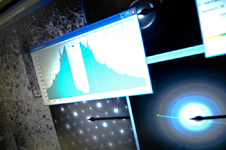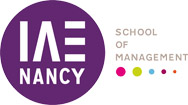Research, which is constantly evolving, is a major priority for our school: Research supports the training offer and participates in pedagogical development. It also contributes to the career progression of our teacher-researchers and to the success of the school.
Our teacher-researchers work in different laboratories: IFG, BETA, 2L2S, CEREFIGE and IRENEE.
The CEREFIGE laboratory is the research unit to which all the Master's level courses offered at IAE NANCY are attached.
Every year, the IAE Nancy organizes a scientific conference.

The whole strategy of the University is based on the concept of « eco-systemic engineering ». Engineering represents the mobilisation of scientific concepts and rigorous methods to build and to implement material or immaterial “objects”. Engineering requires a multidisciplinary approach and the refusal of a strict distinction between what would be theoretical and applied. The design of an object, material or not, must integrate from the outset the insertion of this object into its environment. In this way, engineering that considers each of the objects it designs as part of a whole in a shared environment becomes an "eco-systemic engineering». It therefore mobilises all disciplinary fields, material and life sciences as well as human and social sciences.
The four goals of the scientific policy at the University of Lorraine:
- Strengthening excellence and innovation
- The emergence of new decision-making through the establishment of scientific centres,
- The doctoral college,
- The innovation valorisation and technology transfer policy
1. Strengthening excellence and innovation
Through mobility, partnerships and interdisciplinary
Mobility is usual within the scientific community. Welcoming new professors and teacher-researchers to their research lab and furthering their time dedicated to the research. Allowing the venue of famous foreign researchers. Encouraging the departure that allows the development of new partnerships. These are the challenges for the University of Lorraine.
Partnerships that exist between the University and the CNRS, INRA, INRIA and INSERM, which occur in the region, are a very important support for the scientific strategy and for managing the laboratories.
The size of the University of Lorraine and the wealth of its players make it possible to consider the multidisciplinary approach as a vector for large-scale actions or as a facilitator for the development of more risky projects.
2. Scientific centres working for the emergence of the scientific community
In a new context: the University of Lorraine
The scientific centres, intermediary level between the central bodies and the labs, develop the strategy that is essential for the University of Lorraine given its size and the regional research network.
The University of Lorraine works with 10 scientific centres (established in the decree creating the University of Lorraine). Their directors are members of the executive board and work closely with the university's scientific council and its vice-president.
3. The regional College of doctoral schools
Mutualisation of actions and promotion of the Lorraine doctorate
The culture of cooperation between doctoral schools is long-standing and puts the doctorate in a new consultation body: the Lorraine College of doctoral schools.
The training of doctoral students includes disciplinary or multidisciplinary courses, preparation of the doctoral student’s professional project, and open courses. There is a strong mobilisation of the community around the doctorate to enable the achievement of the thesis in the best possible conditions as well as the promotion of the doctorate to partners within the socio-economic world.
4. Innovation, Valorisation and Transfer
These are the objectives of the University of Lorraine, responsible player of the economic rebound
The development of valorisation tools, their assimilation by researchers through awareness campaigns, and the support for projects, before the setting-up of companies, are three examples of the university's missions. The DRV's sub-directorate for development helps researchers from laboratories and doctoral students to achieve these missions.
Strongly involved in the SATT-Grand-Est project, the University is building its valorisation strategy with its partners, such as the CNRS, INSERM, INRA, INRIA as well as the Incubateur Lorrain / Lorraine Incubator.

